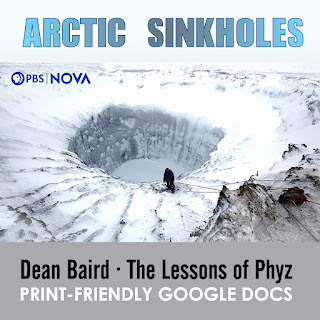My high school physics and science curriculum at TPT, Pearson Education, Arbor Scientific, and PhET
Sunday, January 29, 2023
Zero to Infinity
Arctic Sinkholes
Sunday, January 22, 2023
Earth Revealed
Earth Revealed shows the physical processes and human activities that shape
Monday, January 2, 2023
Leave a review, get a TPT credit
I only became aware of this recently; it seems like a pretty good deal. A post that details the craft that goes into the creating of the Lessons of Phyz video question sets is directly below this post, if you're looking for inspiration for leaving positive reviews. And you can still write a better review than Open AI's ChatGPT can.
TPT credits are points that can be applied to future TPT purchases. The amount you can apply is displayed in U.S. Dollars (USD) on your account balance page.
The primary way you can earn TPT Credits is by leaving ratings and reviews on your purchased resources. You may also receive TPT Credits on your account because they're added by Team TPT, for example as reimbursement — those will be listed "Credits added to your account by TPT Staff."
When you leave a review, you'll earn 1 credit for every $1 you spent on TPT for that resource. Each credit has a value of 5 cents, so every 20 credits earned equals $1 you can apply to future TPT purchases. We'll round up from 50¢ for you! If you provide a review on a resource priced at $4.75, you'll earn 5 credits.
TPT credits are only earned for reviews left on active, paid resources. Credits are not earned on gift card purchases, inactive resources, or free downloads.
After using a resource, you can leave a rating and review by following these steps:
- Go to your "My Purchases" page.
- Click the "Leave a review" button (Note: you won't be able to leave a review until you've used the resource)
- Answer each question and leave a review sharing more about your experience with the resource. Then, click "Done."
To redeem your credits, look for "Use Account Balance" located under the "Checkout" button in your cart. Enter the amount you'd like to apply toward your order, and click "Apply."
If you've purchased any resources at The Lessons of Phyz, go get some credits!



